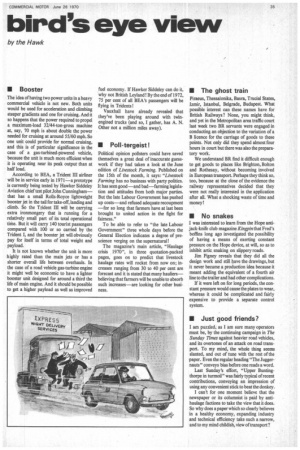bird's eye view
Page 37

If you've noticed an error in this article please click here to report it so we can fix it.
by the Hawk • Booster
The idea of having two power units in a heavy commercial vehicle is not new. Both units would be used for acceleration and climbing steeper gradients and one for cruising. And it so happens that the power required to propel a maximum-load 32/44-ton-gross machine at, say, 70 mph is about double the power needed for cruising at around 55/60 mph. So one unit could provide for normal cruising, and this is of particular significance in the case of a gas-turbined-powered vehicle, because the unit is much more efficient when it is operating near its peak output than at half load.
According to BEA, a Trident III airliner will be in service early in 1971—a prototype is currently being tested by Hawker Siddeley Aviation chief test pilot John Cunningham— that has a small Rolls-Royce lightweight booster jet in the tail for take-off, landing and climb. So the Trident HI will be carrying extra ironmongery that is running for a relatively small part of its total operational time. But it will carry 140 tourist passengers compared with 100 or so carried by the Trident I, and the booster jet will obviously pay for itself in terms of total weight and payload.
It is not known whether the unit is more highly rated than the main jets or has a shorter overall life between overhauls. In the case of a road vehicle gas-turbine engine it might well be economic to have a lighter booster unit designed for around a third the life of main engine. And it should be possible to get a higher payload as well as improved fuel economy. If Hawker Siddeley can do it, why not British Leyland ! By the end of 1972, 75 per cent of all BEA's passengers will be flying in Tridents !
Vauxhall have already revealed that they've been playing around with twinengined trucks (and so, I gather, has A. N. Other not a million miles away).
• Poll-tergeist!
Political opinion pollsters could have saved themselves a great deal of inaccurate guesswork if they had taken a look at the June edition of Livestock Farming. Published on the 15th of the month, it says: "Livestock Farming has no business with party politics. It has seen good —and bad—farming legisl ation and attitudes from both major parties. But the late Labour Government has pushed up costs—and refused adequate recoupment —for so long that farmers have at last been brought to united action in the fight for fairness."
To be able to refer to "the late Labour Government" three whole days before the General Election indicates a degree of prescience verging on the supernatural !
The magazine's main article, "Haulage crisis 1970", in three quotation-packed pages, goes on to predict that livestock haulage rates will rocket from now on; increases ranging from 30 to 40 per cent are forecast and it is stated that many hauliers— believing that farmers will be unable to absorb such increases—are looking for other business.
• The ghost train
Piraeus, Thessalonika, Basra, Trucial States, Izmir, Istanbul, Belgrade, Budapest. What possible interest can these names have for British Railways? None, you might think, and yet in the Metropolitan area traffic court last week two BR servants were engaged in conducting an objection to the variation of a B licence for the carriage of goods to these points. Not only did they spend almost four hours in court but there was also the preparatory work.
We understand BR find it difficult enough to get goods to places like Brighton, Bolton and Rothesay, without becoming involved in European transport. Perhaps they think so, too, because at the close of the evidence the railway representatives decided that they were not really interested in the application after all. What a shocking waste of time and money !
• No snakes
I was interested to learn from the Hope antijack-knife club magazine Kingpin that Fred's boffins long ago investigated the possibility of having a means of exerting constant pressure on the Hope device, at will, so as to inhibit artic snaking on slippery roads.
Jim Pigney reveals that they did all the design work and still have the drawings, but it never became a production idea because it meant adding the equivalent of a fourth air line to the trailer and had other complications.
If it were left on for long periods, the constant pressure would cause the plates to wear, whereas it could be complicated and fairly expensive to provide a separate control system.
• Just good friends?
I am puzzled, as I am sure many operators must be, by the continuing campaign in The Sunday Times against heavier road vehicles, and its overtones of an attack on road transport. To my mind, the whole thing seems slanted, and out of tune with the rest of the paper. Even the regular heading "The Juggernauts" conveys bias before one reads a word.
Last Sunday's effort, "Upper Buntingthorpe in turmoil" was fairly typical of recent contributions, conveying an impression pf using any convenient stick to beat the donkey.
I can't for one moment believe that the newspaper or its columnist is paid by antihaulage factions to take the view that it does. So why does a paper which so clearly believes in a healthy economy, expanding industry and technical efficiency take such a narrow, and to my mind childish, view of transport?






















































































































